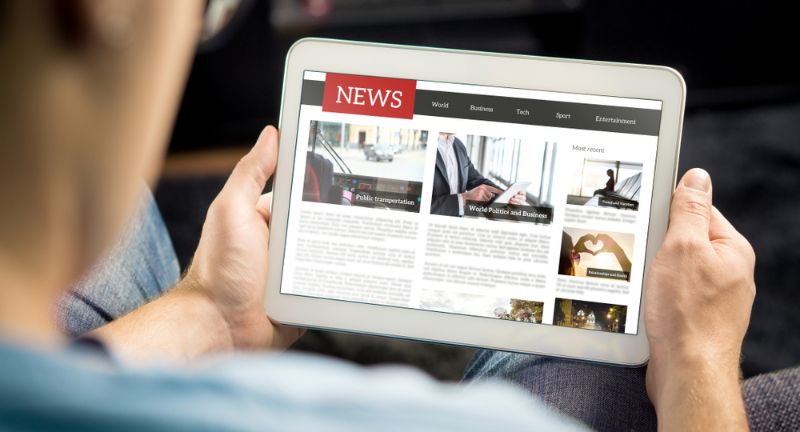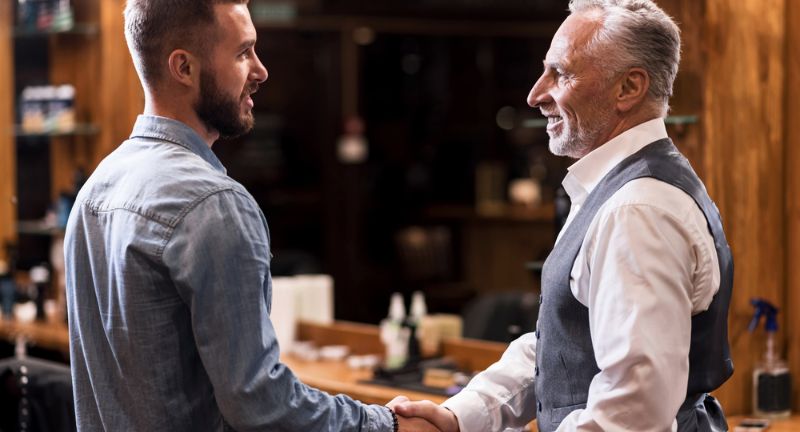NEWS
25 Conversation Tricks to Help You Radiate Confidence
Published
9 months agoon

Shutterstock
Confidence significantly impacts the way we handle social interactions and showcase our persona to others. Both in professional environments and casual chats, displaying confidence can create a memorable impression and build strong relationships. This guide offers 25 conversation tips aimed at enhancing your confidence and improving your engagement with others.
The Power of Assertiveness

Shutterstock
Confidently express your opinions and ideas without crossing the line into aggression. Being assertive means standing up for yourself while also considering and respecting others’ perspectives. Utilize clear and direct communication to convey your thoughts effectively. Cultivate assertiveness in both your professional and personal life to enhance your confidence in advocating for yourself and your beliefs.
Establish Clear Boundaries

Shutterstock
It’s important to confidently assert yourself and establish clear boundaries when necessary during conversations. These boundaries are crucial for sustaining healthy relationships and protecting your well-being. Make sure to communicate your limits and expectations clearly to others, and be firm yet respectful when enforcing them. Keep in mind that setting boundaries is a demonstration of self-respect and can ultimately boost your confidence in social interactions.
Avoid Fidgeting

Shutterstock
Try to reduce nervous habits such as tapping your foot or playing with your hair. These fidgeting behaviors can indicate anxiety or unease, which can undermine your confidence. If you feel the need to fidget, consider using grounding techniques like pressing your feet firmly into the ground or taking deep breaths to help you stay centered. With practice, you can learn to keep your composure and appear more confident during social interactions.
Utilize Gestures

Shutterstock
Incorporate natural hand gestures to underscore key points and express enthusiasm. Using gestures can inject energy into your communication and help maintain the listener’s engagement. Nonetheless, be aware of cultural nuances and refrain from excessive or disruptive motions. Practice in front of a mirror to build confidence and ensure your gestures seamlessly align with your verbal communication.
Encourage In-Depth Conversations with Open-Ended Questions

Shutterstock
To promote more profound discussions, ask questions that go beyond simple yes or no responses. Open-ended questions encourage others to express their thoughts and experiences, nurturing meaningful dialogue. This approach also shows your sincere interest in understanding the other person’s viewpoint. By practicing the art of asking open-ended questions, you can guide conversations toward more enriching and engaging interactions.
Stay Authentic

Shutterstock
It’s important to remain true to yourself by expressing your genuine thoughts and feelings instead of trying to impress others. Authenticity is essential for establishing trust and meaningful connections during conversations. Avoid the urge to pretend to be someone you’re not or to conform to others’ expectations at the expense of your true self. Embrace your unique traits and individuality, allowing your authenticity to shine through in all your interactions.
Stay Up-to-Date

Shutterstock
Stay informed about current events and topics of interest to engage in meaningful conversations. Being well-informed shows your curiosity and intellectual confidence. Allocate time to reading books and articles, or listening to podcasts to broaden your knowledge on various subjects. Contributing insightful comments or asking thoughtful questions will make you appear more confident in discussions.
Use Mirroring

Shutterstock
Subtly mimic the body language and tone of voice of the person you’re speaking with to build rapport. Mirroring creates a sense of connection and understanding between individuals. Pay attention to the other person’s nonverbal cues, such as posture and gestures, and subtly reflect them back. Be careful not to overdo it or mimic in a way that appears mocking; instead, aim for natural and empathetic mirroring to enhance communication.
Confident Body Language

Shutterstock
To project confidence, employ open and expansive body language by keeping your arms uncrossed and directly facing the person you’re speaking with. How you present yourself physically can greatly influence others’ perceptions of you during a conversation. Make a point to avoid defensive gestures like crossing your arms, as these can suggest insecurity or defensiveness. Instead, adopt an open stance to communicate assurance and approachability.
Dress Appropriately

Shutterstock
Wear clothes that make you feel comfortable and confident in your appearance. Dressing appropriately for different occasions can boost your self-assurance and leave a positive impression on others. Choose outfits that reflect your personal style while also considering the context and dress code. When you feel good about how you look, you’re more likely to carry yourself with confidence in social interactions.
Enhance Your Public Speaking Skills

Shutterstock
Participating in activities such as public speaking or joining a debate club can significantly boost your confidence in communicating with others. The art of public speaking is a crucial skill that demands practice and meticulous preparation. Begin with smaller speaking engagements and progressively challenge yourself with larger audiences. As time goes on, you’ll find yourself more at ease and self-assured when addressing the public, which will, in turn, improve your overall conversational confidence.
Good Posture

Shutterstock
Standing or sitting up straight helps project confidence. Your posture communicates a lot about your self-assurance and presence during a conversation. Slouching might suggest disinterest or a lack of confidence, whereas good posture exudes strength and attentiveness. Practice keeping your spine and shoulders properly aligned to appear more confident in any social setting.
Boost Your Confidence through Practice

Shutterstock
Engaging in conversations regularly helps increase your confidence. Think of confidence as a muscle that grows stronger with repeated use. Actively look for opportunities to talk to different people and participate in various discussions. After each interaction, consider what aspects were successful and identify areas where you can improve. Use these reflections to enhance your future conversations. Gradually, you’ll find yourself becoming more at ease and self-assured in social settings.
Take Responsibility for Your Errors

Shutterstock
When you err in a conversation, admit it graciously and proceed without fixating on it. Mistakes are a universal experience, and taking ownership showcases both humility and self-assurance. Steer clear of justifications or finger-pointing; rather, be accountable for your actions. By managing errors with composure and honesty, you indicate that you are self-assured and open to learning from your mistakes.
Speak at a Measured Pace

Shutterstock
Don’t hurry through your words; speaking slowly and intentionally can project a sense of composure. Fast speech may suggest nervousness or a lack of confidence, while a steady pace radiates self-assurance and mindfulness. Pause between sentences to collect your thoughts and allow the listener to process the information. By speaking at a measured pace, you not only appear more confident but also improve the clarity and effect of your message.
Discover Shared Interests

Shutterstock
Identify mutual interests or experiences to build rapport with others. Discovering shared ground fosters a sense of connection and mutual understanding, enhancing the enjoyment and depth of conversations. Whether it’s a hobby, a beloved book, or a common experience, emphasizing these similarities can fortify your relationship with the person you’re engaging with. Stay attentive and show genuine curiosity about the other person’s interests to reveal potential commonalities.
Maintain Eye Contact

Shutterstock
Maintain consistent eye contact to demonstrate confidence and authenticity. This practice indicates that you are focused and actively participating in the dialogue. Nevertheless, avoid excessive staring, which may seem confrontational. Strive for a natural and comfortable level of eye contact for both yourself and your conversation partner.
Speak Clearly

Shutterstock
Enunciate your words and avoid mumbling. Speaking clearly ensures your message is understood and projects confidence and authority. Take your time to articulate each word, especially when discussing important or complex topics. If you find yourself speaking too quickly, remember to pause and breathe.
The Power of a Smile

Shutterstock
A heartfelt smile can quickly make you seem friendlier and more self-assured. It conveys warmth and positivity, fostering a comfortable environment during interactions. Even when you’re anxious, smiling can reduce stress and make both you and the other individual feel relaxed. Make an effort to smile genuinely, and it will become an instinctive aspect of how you communicate.
Recognize Your Value

Shutterstock
Have faith in your own capabilities; true confidence comes from within. Identify and appreciate your strengths and achievements, and don’t hesitate to highlight them when appropriate. Reflect on past successes and obstacles you’ve conquered to strengthen your self-confidence. When you genuinely acknowledge your value, others are more likely to notice and respect it too.
Staying Composed During Stressful Times

Shutterstock
Keep a cool and collected mindset, even when faced with challenging or high-pressure scenarios. Demonstrating calmness under pressure shows strength and confidence in your ability to manage difficulties. Implement stress-management strategies like deep breathing exercises or mindfulness meditation to remain steady. Concentrate on problem-solving instead of fixating on the stressors, and believe in your capacity to handle tough situations efficiently.
Engage Through Active Listening

Shutterstock
Demonstrate genuine interest in conversations by practicing active listening and responding thoughtfully. Techniques such as nodding, paraphrasing, and asking clarifying questions help show your engagement. Refrain from interrupting or planning your response while someone else is speaking. Instead, concentrate on fully understanding their viewpoint. Active listening not only communicates confidence but also helps build rapport and trust with the speaker.
Cultivate Empathy

Shutterstock
Understand and appreciate others’ perspectives, even when you disagree. Empathy requires active listening, recognizing others’ feelings, and validating their experiences. Demonstrating empathy showcases emotional intelligence and maturity, essential aspects of confidence. By putting yourself in others’ situations, you can gain a deeper understanding of various viewpoints and foster stronger interpersonal connections.
How to Accept Compliments Gracefully

Shutterstock
When someone compliments you, respond by simply saying thank you and acknowledging their praise. This demonstrates confidence and shows that you value the recognition. Avoid diminishing your achievements or dismissing the compliment as unwarranted; instead, express your gratitude for their acknowledgment. Gracefully accepting compliments helps reinforce your self-esteem and fosters a confident demeanor in social settings.
Stay Optimistic

Shutterstock
Concentrate on uplifting subjects and steer clear of too much complaining. A positive attitude is infectious and can lift the mood of any discussion. Even when talking about difficulties or obstacles, keep a hopeful perspective and look for possible solutions. Incorporate gratitude and positivity into your everyday routine to develop a strong and assured mindset.
Conclusion

Shutterstock
As you incorporate these conversation tips into your interactions, keep in mind that confidence is a journey, not a destination. It’s natural to experience moments of doubt or insecurity, but consistently practicing these techniques can help you gradually build your self-assurance. Embrace each conversation as an opportunity for growth and learning, and be patient with yourself throughout the process. By developing confidence in your communication skills, you’ll not only make a positive impression on others but also feel more empowered to express yourself authentically. Continue to refine your conversational skills, and observe as your confidence steadily increases.
More From Financially+
-


19 Startling Reasons Why Moving to Texas Is Probably a…
-


Beware: 10 Locations Where You Shouldn’t Plug in Your Phone
-


20 Graceful Strategies for Dealing with a Rude Person
-


25 of the Most Costly Home Improvement Mistakes
-


20 Beloved Baby Boomer Items Millennials Won’t Touch
-


Indestructible Rides: The Most Reliable Cars That Last a Lifetime
-


Unbelievable Feats: 20+ Guinness World Records You Never Knew Existed
-


24 Everyday Groceries with Sky-High Price Tags Now
-


18 Things The Rich Turned From Bargains To Luxury
